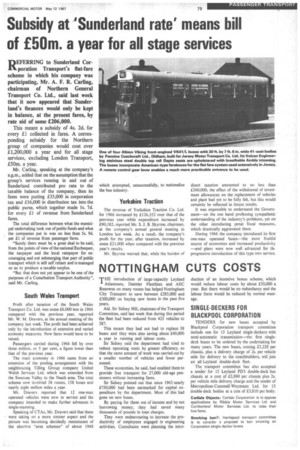Subsidy at Sunderland rate' means bill of f50m. a year for all stage services
Page 81

If you've noticed an error in this article please click here to report it so we can fix it.
DEFERRING to Sunderland CorIMporation Transport's flat-fare scheme in which his company was participating, Mr. A. F. R. Carling, chairman of Northern General Transport Co. Ltd., said last week that it now appeared that Sunderland's finances would only be kept in balance, at the present fares, by rate aid of some £206,000.
This meant a subsidy of 4s. 2d. for every £1 collected in fares. A corresponding subsidy for the Northern group of companies would cost over £1,200,000 a year and for all stage services, excluding London Transport, £50m. a year.
Mr. Carling, speaking at the company's a.g.m., added that on the assumption that the group's services running in and out of Sunderland contributed pro rata to the taxable balance of the company, then its fares were putting £35,000 in corporation tax and £16,000 in distribution tax into the public purse, which together made Is. 7d. for every El of revenue from Sunderland fares.
The total difference between what the municipal undertaking took out of public funds and what the companies put in was no less than 5s. 9d. per £1 of revenue from passenger fares.
"Surely there must be a great deal to be said, from the points of view of the national Exchequer, the taxpayer and the local ratepayer for encouraging and not submerging that part of public transport which is still self reliant and is managed so as to produce a taxable surplus.
"But that does not yet appear to be one of the purposes of a Conurbation Transport Authority", said Mr. Carling.
South Wales Transport
Profit after taxation of the South Wales Transport Co. Ltd. was some £6,000 less in 1966 compared with the previous year, reported Mr. W. M. Dravers, at the annual meeting of the company last week. The profit had been achieved only by the introduction of extensive and varied economy measures. Now fares would have to be raised.
Passengers carried during 1966 fell by over three million, or 5 per cent, a figure lower than that of the previous year.
The main economy in 1966 came from an extension of the pooling arrangement with the neighbouring Tilling Group company United Welsh Services Ltd. which was extended from the Swansea Valley to the Neath area. The total scheme now involved 38 routes, 138 buses and nearly eight million miles a year.
Mr. Dravers reported that 12 one-man operated vehicles were now in service and the company intended to make further advances in single-manning.
Speaking of CTAs, Mr. Dravers said that these were taking on a more sinister aspect and the picture was becoming decidedly reminiscent of the abortive "area schemes" of about 1948 which attempted, unsuccessfully, to nationalize the bus industry.
Yorkshire Traction
The revenue of Yorkshire Traction Co. Ltd. for 1966 increased by £126.352 over that of the previous year while expenditure increased by £90,182. reported Mr. S. J. B. Skyrme, chairman, at the company's annual general meeting in London last week. As a result, the company's profit for the year, after taxation, increased by some £21,000 when compared with the previous year's results.
Mr. Sky-rme warned that, while the burden of
direct taxation amounted to no less than £260,000, the effect of the withdrawal of investment allowances on the replacement of vehicles and plant had yet to be fully felt, but this would certainly be reflected in future results.
It was impossible to understand the Government—on the one hand professing sympathetic understanding of the industry's problems, yet on the other introducing penal fiscal measures, which drastically aggravated them.
During 1966 the company introduced its first one-man operated buses—the most fruitful source of economies and increased productivity —and plans were now well advanced for thi progressive introduction of this type into service.
















































































































































































































































